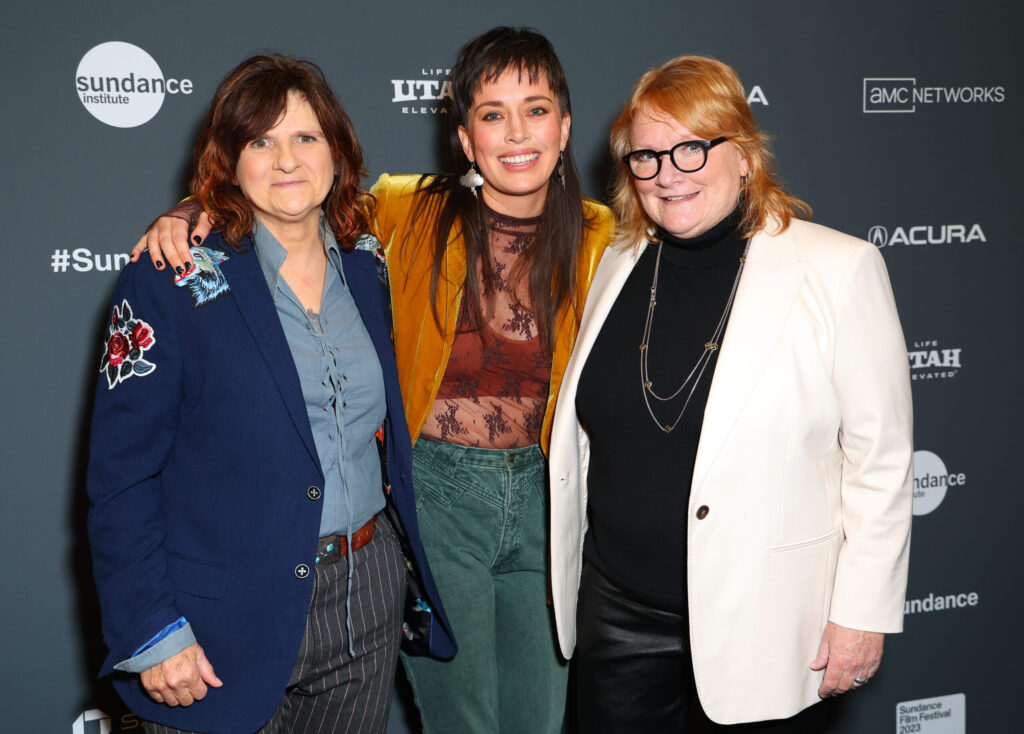With four decades behind them, Emily Saliers and Amy Ray, the women behind the Indigo Girls, are in the midst of a victory lap. Despite a loyal fanbase, evocative songwriting, and artistic consistency, mainstream success and popularity evaded the Girls. As openly queer musicians since the 90s, the duo was stunted by misogyny and homophobia for most of their careers but widely embraced by the LGBT+ community since their early days. Now, with a resurgence in interest for their folk-rock songs following a prominent feature in the Barbie movie, and a documentary directed by Alexandria Bombach, the Indigo Girls are being recognized as the trailblazers and community beacons they were.
Their documentary, It’s Only Life After All, premiered at the Sundance and the Tribeca Film Festivals in 2023. This month, it’s finally hitting movie theaters at select locations on April 10, with early screenings in their hometown of Atlanta, Georgia.
Its first two theatrical showings took place on March 29 at the Tara Theatre to a crowd of eager fans who’ve supported the Girls for decades, the young adults and teens those fans raised, and Salier’s and Ray’s family and friends. After the showings, the duo and the director were present to answer questions from the crowd, followed by acoustic performances of “Shame on You” and “Closer to Fine” (AKA “the Barbie song” as Ray called it)

Bombach, who met the duo through a mutual friend in 2017, became interested in making the Indigo Girls documentary after a quick Google search revealed there currently wasn’t any. During the Q&A, Saliers and Ray gushed about already being big fans of her work, which made it easy for them to get on board with the project. The result was a film that left moviegoers laughing and sniffling interchangeably for two hours.
Except for brief clips featuring fans and family members, Bombach largely allows the Indigo Girls to speak for themselves through the two-hour documentary. The movie is interspersed with old interview footage and decades of private cassettes that Ray recorded. With the addition of the newly recorded footage, Bombach shared that she combed through a whopping 1,000 hours to make the film.
With the help of Bombach’s directorial hand, Saliers and Ray radiate an authenticity uncommon in most rockumentaries.
With the wisdom that hindsight brings, Saliers and Ray speak candidly about their early experiences, able to understand their younger selves with a loving, delicate, and brutally honest perspective, while gracefully exploring their shortcomings.
As in everything else they do, the documentary centers the women’s activism and political involvement. Saliers and Ray were always more interested in the palpable community their music formed than celebrity status. At one point in the film, Saliers says, “It was always about community—the feeling you get in a room with people you are singing to.”
In the documentary, we watch them contend with the naivety of their earlier social activism. They mature from slogans like “save the earth” and “recycle” to more nuanced ecological perspectives embodied by Native Americans. Their dedication grows but they take up space only to support the voices of others. A little later in the film, when the Indigo Girls are at a rally for Black Lives Matter, the speaker introduces them saying “They weren’t even here to sing. They only wanted to support and since we know who they are we want them to sing.”
There’s an almost comical aspect to how different they are and yet, their differences complement each other well and the admiration they hold for one another is evident.
Saliers, raised on folk, is often featured wearing brighter colors. Ray, raised on punk and alt-rock, gravitates to darker tones and grungier outfits. More notably, they have striking differences in personality. Ray, trailing a year behind Saliers, looks up to Salier’s diplomacy. Ray says of herself, “I was always so angry. It wasn’t healthy.”
Saliers, the more reserved of the two, initially avoided coming out publicly as a lesbian. While Ray at one point in the film says, “I’ve never been in the closet.” Over the years, they’ve spoken candidly about the impact internalized homophobia has had on their self-esteem. They reflect on the jokes made at their expense and spaces they’ve been excluded from as Bombach shares with us pieces from the past.
The documentary is personal and intimate, but somehow the story feels so much bigger. With the help of Bombach’s directorial hand, Saliers and Ray radiate an authenticity uncommon in most rockumentaries. On the screen, fans give sincere odes to the band that quite literally saved their lives, and the theater audience whoops and cheers in recognition. Others shout back “They saved my life too.”
Bombach’s insightful touch, the sincerity and introspection of the Indigo Girls, and the community surrounding their music set this rockumentary apart from others. The Indigo Girls are a beacon. Rather than the cult of celebrity, the air surrounding them is decidedly different. The space feels uniquely democratic. This is a documentary you don’t want to miss the chance to see in theaters.
Buket is a graduate of the University of Georgia (Music Business Alum) and the current Editor-in-Chief of Vinyl Mag. She believes that a sincere lover of music can find something to like in just about any song. She loves to write to escape the grueling drudgery of capitalism. She is currently based in Georgia, but might soon be coming to a music festival near you.


